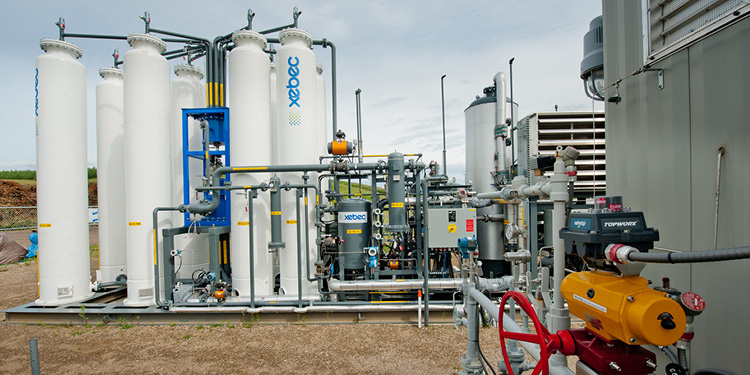
FortisBC proposes RNG project at Prince George landfill
May 9, 2019
By FortisBC
 FortisBC owns and operates the biogas upgrading plant at the Salmon Arm Landfill. Photo source: www.fortisbc.com
FortisBC owns and operates the biogas upgrading plant at the Salmon Arm Landfill. Photo source: www.fortisbc.com The Regional District of Fraser-Fort George (RDFFG) announced approval in principle for an agreement where FortisBC will purchase landfill gas from the Foothills Boulevard Regional Landfill to purify and inject the gas into its natural gas distribution system as Renewable Natural Gas (RNG).
“The demand for RNG is significant. We welcome the opportunity to bring on new supply as we pursue our target of having 15 per cent of our gas supply be renewable by 2030,” says Douglas Stout, vice-president of external relations and market development, FortisBC. “If approved, this project will be the first northern Renewable Natural Gas project for FortisBC and will support the development of a locally produced, carbon neutral energy source in B.C.”
When bacteria breaks down organic waste from sources such as landfill sites, agricultural waste and wastewater treatment facilities, biogas (mostly made of methane) is produced. FortisBC works with local farmers and municipalities to capture and purify this biogas, which would otherwise escape into the atmosphere, to create RNG. This sustainable energy source blends seamlessly with conventional natural gas in FortisBC’s distribution system, lowering the overall carbon intensity of the natural gas being delivered. FortisBC currently works with five RNG suppliers and owns and operates two RNG purification facilities on existing landfills.
The Foothills Boulevard Regional Landfill currently generates enough landfill gas to produce approximately 70,000-100,000 gigajoules (GJs) of RNG annually, enough to heat up to 1,100 homes on 100 per cent RNG. The estimated annual GHG emissions savings would be approximately 3,500 – 5,700 tonnes of carbon dioxide equivalent (tCO2e), or the equivalent of taking up to 1,200 cars off the road.
“Since 2002, the Regional District has been capturing landfill gas and flaring it to convert the methane to carbon dioxide and water,” says Art Kaehn, Chairman, RDFFG. “The proposed agreement with FortisBC helps us achieve our goal of finding a beneficial use for landfill gas while further reducing the environmental impact of our solid waste facilities.”
RDFFG will seek approval from electors as the agreement spans a 20-year term. Should the project receive elector approval, the RDFFG and FortisBC will seek to finalize an agreement subject to approval by the British Columbia Utilities Commission (BCUC).
If approved by the electors and the BCUC, RDFFG will continue to be responsible for the ownership and operation of the landfill and landfill gas collection system. FortisBC will pay RDFFG a fixed price per GJ for raw landfill gas and will be responsible for the costs associated with purifying and injecting the RNG in to the natural gas distribution system.
For more information on Renewable Natural Gas, its creation process and many benefits, visit fortisbc.com/RNG.
Print this page